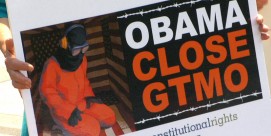In This Episode << SLIDE LEFT TO SEE ADDITIONAL SEGMENTS
Iraq, Just War, and National Security Strategy
Jonathan E. Brockopp is associate professor of history and religious studies at Pennsylvania State University and editor of ISLAMIC ETHICS OF LIFE (University of South Carolina Press, 2003):
I am afraid there is little to comment on in the new national security strategy document confirming the U.S. government’s commitment to “the option of preemptive actions” with regard to either religion or ethics. From the perspective of the White House, there is every reason to acquire more power and to call that acquisition just. Indeed, there is no country capable of preventing Americans from claiming, asserting, and justifying the use of even more force in the future.
As a Christian, I accept this desire for power and security as yet one more example of corruption in this world “east of Eden.” Yet I also bristle at any suggestion that this presidency is driven by Christian principles. There are no religious doctrines, much less Christian ones, which inform this document; rather, it is built on faultless, and soulless, logic. First, the document points out that “legal scholars and international jurists often conditioned the legitimacy of preemption on the existence of an imminent threat — most often a visible mobilization of armies, navies, and air forces preparing to attack.”
We do not face such threats today, so instead of abandoning the doctrine of preemption, the document suggests revising our perception of a threat: “We must adapt the concept of imminent threat to the capabilities and objectives of today’s adversaries [who will use] weapons that can be easily concealed, delivered covertly, and used without warning.”
The argument is clear: long ago, when armies were visible, we required evidence to justify preemption; now that threats are invisible, it would be absurd to require visible evidence. Therefore, preempt when threatened.
Yet it is important to add that visible enemies also defined a response proportional to the threat — after you destroyed the enemy’s army, you stopped bombing. Now that the enemy is invisible, there is also no way to measure proportion. There is no way to know when to stop.
In these and other ways, ethics is reduced to efficiency, and this document efficiently lays out a justification for endless war. Whether or not this proves to be an effective deterrent strategy, it is certainly a blueprint for devoting ever greater resources to preparations for war.
Andrew J. Bacevich is professor of international relations at Boston University and author of THE NEW AMERICAN MILITARISM (Oxford University Press, 2005):
Setting aside some very formidable moral and legal objections, a doctrine of preventive war makes sense only if it works — that is, if its implementation yields enhanced security at a reasonable cost. In the American case, the Bush administration’s belief in the efficacy of preventive war stemmed from its confidence in the efficacy of American military power. In his introduction to the National Security Strategy of the United States, which the White House issued in September 2002, President Bush wrote that “today the United States enjoys a position of unparalleled military strength.” The assumption underlying the Bush Doctrine, never made explicit, was that the unparalleled quality and capabilities of America’s armed services made preventive war plausible.
In March 2003, the president implemented the Bush Doctrine, ordering the invasion of Iraq. In doing so, he also put to the test his administration’s assumptions about American military power. That test has now continued long enough for us to draw some preliminary conclusions. The most important of those conclusions is the following: as measured by the effectiveness and capacity of American arms, the quality of American generalship, and the adherence of American soldiers to professional norms, this administration has badly misread what the U.S. military can and cannot do. The sword of American military power is neither sharp enough nor hard enough to meet the demands of preventive war.
The Bush Doctrine has failed and on that basis alone should be scrapped.







